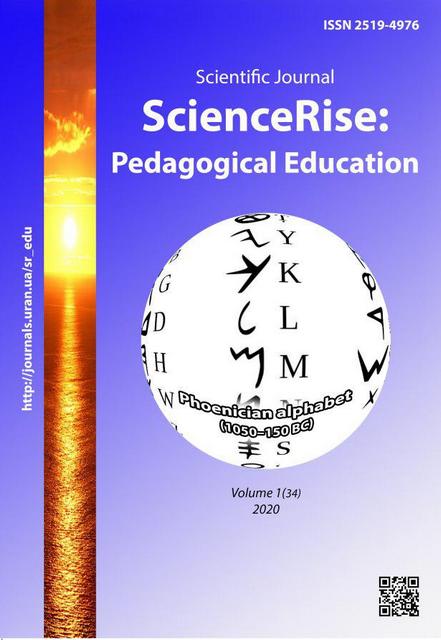Gender open university as a platform for continuous gender education: experience in the development of innovative educational practices in Ukraine
DOI:
https://doi.org/10.15587/2519-4984.2020.193438Keywords:
gender discrimination, labor migration, non-formal adult education, Gender Open UniversityAbstract
In the article the relevance and necessity of overcoming gender stereotypes, regarding the distribution types of labor and areas of work, the development of effective mechanisms for promoting female leadership and non-discriminatory practices in choosing human development strategies within the labor sphere in Ukraine are substantiated in the context of searching the ways to reduce the negative consequences of labor migration in Ukraine. The system of non-formal adult education plays an extremely important role in introducing the concept of general gender education into life, as a focused process of developing a person throughout life through the implementation of educational programs and services, and educational and informational activities within and outside higher education. The problem of creating the innovative structure of non-formal adult education, reducing the negative impact of gender stereotypes in the labor sphere, attracting to a competitive activity in various public spheres those segments of the population that have traditionally been the object of labor discrimination and deprivation (women, persons with disabilities, elderly people, migrants, etc.) is becoming relevant in Ukraine.
To overcome the gender discrimination and ensure the process of continuous gender education of the population, an innovative partnership project “Gender Open University” was introduced for the first time in Ukraine. Its goal was to overcome the consequences of gender discrimination in the social and labor sphere, to prevent the spread of gender stereotypes and discriminatory practices in the field of social protection and labor relations through continuous gender education of social specialists and the general public.
The project is designed for a long-term result - the creation and systematic functioning of an innovative educational structure to increase the level of gender literacy and culture of social workers as a factor in preventing the leakage of labor resources, mitigating the effects of labor migration through the involvement of new traditionally deprived social groups in labor activity
References
- Pro zabezpechennia rivnykh prav ta mozhlyvostei zhinok i cholovikiv (2018). Zakon Ukrainy No. 2866-IV. 07.01.2018. Available at: https://zakon.rada.gov.ua/laws/show/2866-15
- Pro zasady zapobihannia ta protydii dyskryminatsii v Ukraini (2012). Zakon Ukrainy No. 5207-VI. 06.09.2012. Available at: https://zakon.rada.gov.ua/laws/show/5207-17
- Pro zatverdzhennia Derzhavnoi sotsialnoi prohramy zabezpechennia rivnykh prav ta mozhlyvostei zhinok i cholovikiv na period do 2021 roku (2018). Postanova Kabinetu Ministriv Ukrainy No. 273. 11.04.2018. Available at: https://zakon.rada.gov.ua/laws/show/273-2018- %D0 %BF
- Fakultatyvnyi protokol do Konventsii pro likvidatsiiu usikh form dyskryminatsii shchodo zhinok (1999). Orhanizatsiia Obiednanykh Natsii No. 995_794. 06.10.1999. Available at: https://zakon.rada.gov.ua/laws/show/995_794
- Natsionalna dopovid «Tsili staloho rozvytku: Ukraina» (2017). Available at: http://www.un.org.ua/ua/publikatsii-ta-zvity/un-in-ukraine-publications/4203-2017-natsionalna-dopovid-tsili-staloho-rozvytku-ukraina-iaka-vyznachaie-bazovi-pokaznyky-dlia-dosiahnennia-tsilei-staloho-rozvytku-tssr
- Education and gender equality. Official site of United Nations Educational, Scientific and Cultural Organization. Available at: https://en.unesco.org/themes/women-s-and-girls-education Last accessed: 27.12.19
- Grace, A. P., Gouthro, P. A. (2000). Using Models of Feminist Pedagogies to Think About Issues and Directions in Graduate Education for Women Students. Studies in Continuing Education, 22 (1), 5–28. doi: http://doi.org/10.1080/713695714
- Davies, B., Saltmarsh, S. (2007). Gender economies: literacy and the gendered production of neo‐liberal subjectivities. Gender and Education, 19 (1), 1–20. doi: http://doi.org/10.1080/09540250601087710
- Stoet, G., Geary, D. C. (2015). Sex differences in academic achievement are not related to political, economic, or social equality. Intelligence, 48, 137–151. doi: http://doi.org/10.1016/j.intell.2014.11.006
- Maierchyk, M., Plakhotnik, O., Yarmanova, H. (Eds.) (2017). Hender dlia media. Kyiv: Krytyna, 224.
- Levchenko, L. (2019). Henderne tiazhinnia. Kyiv: Folio, 189.
- Strelnyk, O. (2017). Turbota yak robota: materynstvo u fokusi sotsiolohii. Kyiv: Krytyna, 280.
- Hendernyi analitychno-informatsiinyi Tsentr «Krona». Available at: http://www.krona.org.ua/ Last accessed: 30.10.19
- Muzei zhinochoi ta hendernoi istorii (Gendermuseum) (2016). Available at: https://www.genderculturecentre.org/muzey-zhinochoi-ta-gendernoi-istorii-gendermuseum/ Last accessed: 30.10.19
- Zvit pro hendernyi analiz rezultativ Vseukrainskoho opytuvannia shchodo dotrymannia prav VPO. Ofitsiinyi sait hendernoho analitychno-informatsiinoho Tsentru «Krona». Available at: http://krona.org.ua/assets/files/library/zvit-pro-gendernuj-analiz-dotrumannja-prav-vpo.pdf
- Hendernyi biudzhetnyi analiz prohram, yaki finansuiutsia z derzhavnoho ta mistsevykh biudzhetiv. Styslyi vyklad. Available at: https://issuu.com/625237/docs/buklet_2016
- Rasskazova, O. I. (2017). Hendernochutlyvyi pidkhid u roboti z vrazlyvymy verstvamy naselennia u sotsialno-pravovii sferi. Kharkiv: KhHPA, 78.
Downloads
Published
How to Cite
Issue
Section
License
Copyright (c) 2020 Olha Rasskazova, Iuliana Domina, Tetiana Hladun

This work is licensed under a Creative Commons Attribution 4.0 International License.
Our journal abides by the Creative Commons CC BY copyright rights and permissions for open access journals.
Authors, who are published in this journal, agree to the following conditions:
1. The authors reserve the right to authorship of the work and pass the first publication right of this work to the journal under the terms of a Creative Commons CC BY, which allows others to freely distribute the published research with the obligatory reference to the authors of the original work and the first publication of the work in this journal.
2. The authors have the right to conclude separate supplement agreements that relate to non-exclusive work distribution in the form in which it has been published by the journal (for example, to upload the work to the online storage of the journal or publish it as part of a monograph), provided that the reference to the first publication of the work in this journal is included.







